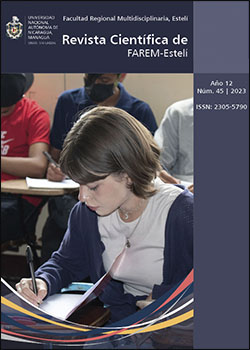Competencies developed by university students through research as a learning strategy at UNAN-Managua, FAREM-Matagalpa, Nicaragua
DOI:
https://doi.org/10.5377/farem.v12i45.16037Keywords:
Competencies, higher education, research, competency modelAbstract
All students in their professional training should develop competencies that allow them to develop in the personal, professional and work environment. But, what competencies can be achieved with the new competency-based curriculum? The objective of this study is to identify the competencies developed by the students of UNAN-Managua, FAREM-Matagalpa, through research as a learning strategy. Likewise, this study is based on the difficulties that have been identified in the research work done by the students. For this purpose, it was necessary to apply a survey to students of this university, consult the state of the art or works that have been done with similar objectives and the bibliographic review of sources, which support this study. The results obtained are: the students of this university, and more those who come from rural areas, are of limited economic resources, most of them have a cell phone, but they do not always have internet, and in some places where they live they do not have internet signal to be able to do research, and they have to do their research in the university library. In despite of the many difficulties presented, the students state that they have achieved some competencies such as: bibliography search in reliable sources, reading comprehension, vocabulary expansion, critical thinking, improvements in the use of APA regulations and writing, among others. This article concludes that higher education students develop competencies through research as a strategy in the new competency-based model.
Downloads
References
Altamar, F,J.,Arvilla, A.J., y Matos, C.M. (2011). El uso de las herramientas tecnológicas en la motivación de los alumnos hacia el aprendizaje.Proyecto pedagógico de investigación, Universidad del Magdalena, Santa Marta, Colombia.
Arrechavala-Vargas, R. (2011). Las universidades y el desarrollo de la investigación científica y tecnológica en México: una agenda de investigación. Revista de la Educación Superior, LX(158), 41-57.
Cepeda-Dovala, J. M. (2014). Estrategias de enseñanza para el aprendizaje por competencias. México: UNID Editorial Digital. Obtenido de https://elibro.net/es/ereader/unanmanagua/41156
Jiménez-Galán, Y. I., Hernández-Jaime, J., & González, M. A. (22 de abril de 2013). Competencias profesionales en la educación superior; justificación, evaluación y análisis. Innovación educativa (México, DF), 13(61).
Marrero-Sánchez, O., & Pérez-Zulueta, M. A. (2014). Competencias investigativas en la Educación Superior. RES NON VERBA, 55-67.
Monereo, C. (2021). ¿Cómo evaluar las competencias? Estrategias innovadoras y exitosas. (L. Del Pozo, Entrevistador) youtube.
Real Academia Española (2014) (23°). Obtenido de https://dle.rae.es
Sanz, M. L. (2016). Competencias cognitivas en Educación Superior. Madrid España: Narcea S. A Ediciones.
Published
Issue
Section
License
Copyright (c) 2023 Revista Científica de FAREM-Esteli

This work is licensed under a Creative Commons Attribution-NonCommercial-ShareAlike 4.0 International License.



